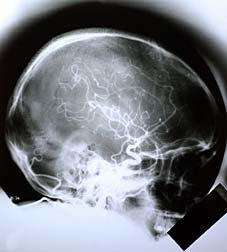One of the biggest challenges in addressing neuropsychological functioning and recovery from MTBI is that of diagnosing MTBI itself; there is no consensus diagnosis. Numerous systems have been developed to classify TBI along the continuum from mild to severe. Most rely on acute injury characteristics such as Glasgow Coma Scale (GCS) scores, length of loss of consciousness (LOC), posttraumatic amnesia (PTA), as well as findings from neuroimaging techniques.
 One of the most commonly used definitions was adopted by the Mild Traumatic Brain Injury Committee of the Head Injury Interdisciplinary Special Interest Group of the American Congress of Rehabilitation Medicine (ACRM). This standard indicates that a patient has sustained a MTBI if he or she has a "traumatically induced physiological disruption of brain function, as manifested by at least one of the following:
One of the most commonly used definitions was adopted by the Mild Traumatic Brain Injury Committee of the Head Injury Interdisciplinary Special Interest Group of the American Congress of Rehabilitation Medicine (ACRM). This standard indicates that a patient has sustained a MTBI if he or she has a "traumatically induced physiological disruption of brain function, as manifested by at least one of the following:1) Any period of LOC
2) Any loss of memory for events immediately before or after the accident
3) Any alteration in mental state at the time of the accident (e.g., feeling dazed, disoriented, confused); and ,
4) Focal neurological deficits(s) that may or may not be transient."
It also adds that the severity of the injury does not exceed the following:
1) LOC of 30 minutes,
2) After 30 minutes, an initial GCS score of 13-15; and
3) PTA not greater than 24 hours.
Although a discussion of the biomechanics of MTBI is beyond the scope of this commentary, several studies have begun to establish a minimal biomechanical threshold sufficient to cause MTBI (linear gravitational acceleration of 80-100g) and the influence of rotational forces must be considered when determining if an accident was sufficient to cause brain injury and whether the presenting complaints correlate with the biomechanics.
Common post-concussion symptoms include headache, blurred vision, dizziness, subjective memory problems and other cognitive difficulties. Most studies indicate a pattern of gradual acute symptom recovery within the first 1-2 weeks after MTBI in the majority of cases, extending out several weeks in other cases. A very small percentage of cases have symptoms persisting beyond 3 months.
In "complicated' MTBI, in which there is evidence of structural pathology on imaging, this increases recovery time and is more consistent with that seen in cases of moderately severe TBI.
However, in uncomplicated MTBI, persistent symptoms may be attributable to factors other than MTBI including psychosocial problems, pre-existing psychiatric diagnosis or personality disorder, other medical etiology (prior history of TBI, etc) and other situational factors (e.g., litigation/compensation, PTSD).
McCrea notes that the following guidelines hold up across studies:
1) most severe symptoms are evident within minutes of injury;
2) delayed symptom onset is rare;
3) a combination of physical and cognitive symptoms is most common;
4) there is measurable improvement within hours of injury;
5) gradual symptom recovery occurs in 7-10 days (with the exception of more complicated MTBI cases);
6) symptoms persisting beyond expected recovery course are often attributable to non-injury related factors.
READ MORE Brain Injury LEGAL NEWS
Neuropsychologists evaluate and diagnose the nature of neuropsychological symptoms that persist beyond the usual recovery time expected for MTBI. They recognize the nature of the possible cognitive consequences as well as assess for other non-injury-related factors that may perpetuate post-concussive symptoms.
For more information, please contact Atrium Psychological Group by clicking here
Kimberly Alfano, Ph.D., ABP (CN)
Board Certified Neuropsychologis

READER COMMENTS
crystal huber
on